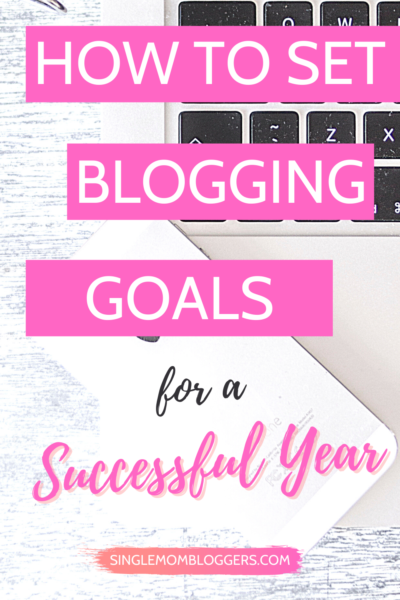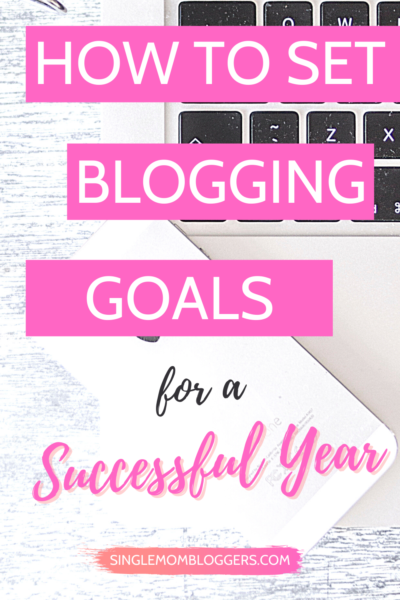Creating clear blogging goals will set you up for success as a blogger this year. Learn how to create effective goals, supercharge them and get the results you want.
This post includes affiliate links. If you make a purchase using an affiliate link I may get a few bucks, at no extra cost to you. As an Amazon Associate I earn from qualifying purchases. To learn more, read the Affiliate Disclosure.
You have a choice this year. You can let the days pass, keeping yourself busy, and hoping for the best. Or you can set yourself apart, and join the ranks of the successful bloggers. How? By setting clear blogging goals, reviewing them regularly and working consistently to reach them.
Setting goals could be the difference between 2025 being your best year ever or just another passing year.

Why Goal Setting is the Secret to Blogging Success
Do you set aside time regularly to plan what you want to achieve in your blogging business? If not, it’s time to start.
Setting aside time to plan out what goals you want to focus on each year, and further breaking those down by quarters, months and weeks, will be crucial to your success.
Whether it’s a DIY project or your blogging business, starting with a clear plan keeps you focused. Instead of spending time trying to figure out what you should be working on, you know exactly what needs to come next.
With a clear goal in mind, it becomes easy to create effective and efficient plans and actionable to-do lists.
Setting blogging goals for yourself helps you think outside the box. It creates a sense of urgency, and resourcefulness. You have a goal to reach, so you dig deeper to get it done.
For example, let’s say you were to set a specific income goal for next month. You write it down and keep it front and center every day. Then get to work and start to notice what happens next.
With that clear goal in place, you start to think of things that didn’t occur to you before. You come up with creative ways to make more money. You decide to create a video review of an affiliate product, promote it widely, and you make a few sales.
You’re more resourceful than you think, and a clear goal or deadline can really push you to find or create solutions you didn’t see before.
“An average person with average talents and ambition and average education, can outstrip the most brilliant genius in our society, if that person has clear, focused goals.”
Mary Kay Ash
Entrepreneur, Founder, Mary Kay Cosmetics, Inc.
Set Yourself Up for Blogging Success with Clear Goals
If you’re committed to growing your blog, start the new year strong with a clear intention. Don’t just keep winging it and hoping for the best. If that strategy didn’t work last year, it won’t work this year either.
The steps in the section below will guide you through cultivating a success mindset, visualizing your blogging success and using the past to inform your future.
1. Mindset for Blogging Success
To really ramp up your success rate, you can put your subconscious mind to work for you. While you’re busy on your to-do list, cooking dinner for the kids, and even sleeping, your subconscious mind is always working. With a success mindset in place, your subconscious keeps working towards your goals, behind the scenes.
If you don’t have a mindset for success, you won’t be successful. It’s simple really. If you believe you can do it, you can. If you believe that you can’t, you can’t.
Notice what you’re believing about yourself right now. Push out any opinions you’re getting from other people in your life, and just look at what you personally believe. Being mindful about your negative thoughts and limiting beliefs is the first step to shifting them.
One tool you can use to shift your thoughts to a success mindset is with reframing. When the thought “I’ll never make any money blogging” comes up, try to reframe it to something true and more positive such as “I have a lot to learn to make money blogging and I am taking steps to do it!” Notice how you feel when you change the thought to something more positive.
It’s not about changing the thought “I’ll never make it” into “I’m the best blogger ever” because for most, that doesn’t feel true. Choose positive thoughts you can really believe and feel into. Positive thinking that stays grounded in reality can be very powerful, and will create a lasting mindset for blogging success.
2. Visualizing Your Success
Close your eyes gently and take some deep belly breaths. Really let your belly expand. This sends signals to your brain that you are safe and reduces the stress response in your body. It’s always a good idea to start anything, even goal setting, from a place of calmness.
Now think ahead to one year from today. What is your life like? What have you achieved? Close your eyes again and feel into that success. Using the present tense, say or write what is true one year from now.
Negative, doubting thoughts may creep in, but focus on the positive feelings. If your goals seem too unrealistic to feel them in the present tense, dial them back a bit. I always recommend setting goals that are just outside your comfort zone, but not so far that they feel impossible.
For example, you might feel and say “I am earning $3000 each month from my blog”, or “I love the sponsored work I’m getting from my favorite brands”. Whatever it is you want, feel it and state it in the present. Try different statements until it feels true and possible.
Why Visualize
It’s very easy to skip over this step, to think it’s not necessary to visualize or feel into it. It may sound silly to you, or intimidating. But it takes only a minute or two and I promise you, it can make a tremendous difference in your results. Top athletes use visualization to see themselves at the finish line before the race begins. They feel into the way their legs feel, the quick pace of their heartbeat, the joy of the win.
Doing this exercise puts you ahead of the average blogger. Most bloggers don’t take the time to set goals, let alone visualize their success.
If you want to go even deeper, you may pull an Oracle card, do a Tarot spread, meditate, or create a vision board to strengthen your focus and the powers of manifestation.
3. Take Time to Reflect on What Worked
You don’t really know your business unless you know your numbers. Review last year’s numbers around traffic, sales, income, subscribers, followers – any metric you want to track – before you start setting goals for the coming year. The same holds true if you’re setting goals on a quarterly or monthly basis.
It’s important to take a moment to reflect on what you’ve accomplished first, and to make peace with both the successes and failures.
Being in business means having some lows (we all go through it), and it won’t help to beat yourself up over a lackluster list-building campaign or a post that didn’t get the traffic you anticipated. Celebrate instead that you put yourself out there and got the work done. Use those experiences as a jumping off place for success as you set new goals and move forward.
If you’re regretful because you let too much time go by without giving your blogging business enough attention for a real shot at success, it’s time to make a decision. Are you in or out? If you’re in, recommit to your blog and start setting goals, getting organized and making a plan for success.
Weekly Checklist for New Bloggers
How to Set Blogging Goals the SMART Way
The easiest way to set blogging goals is to be vague. I want more traffic, I want to make money blogging, I want to quit my full time job. All valid goals, but not very effective.
Instead, you need to create SMART blogging goals if you want results. The SMART acronym stands for: Specific, Meaningful, Actionable, Realistic, and Timely. These are goals that get you crystal clear, focused and primed for success as a blogger.
With your visualized dreams in mind, ask yourself how to make each a clear goal using the following guidelines.
Is your goal Specific?
Rather than setting a vague goal like “I want more traffic and money”, you set a goal such as “I want to reach 1000 pageviews per month”, or “I will earn $2000 each month”.
Will your goal be Measurable?
Specific goals will generally be more easily measured. To measure progress on your traffic goals, you’ll want to be sure you have Google Analytics set up and check your stats at least monthly. Use a spreadsheet or income tracking tool to keep record your income.
Pro Tip: I also like to think of the M for Meaningful. Be sure you set blogging goals that matter to you in a big way. If it’s not a meaningful goal, one that really means something to you on a deep level, you will not give it the energy and focus it needs.
Are your goals Actionable?
Do you have the power to take action on this goal, or does it rely solely on external forces and other people? A SMART goal is one that you can bring into being primarily under your own steam. That doesn’t mean you don’t have support, but it does mean that the action steps can be taken by you.
If you set a goal such as “I want 500 Instagram followers” but you don’t have any idea what steps you must take to achieve that goal, it isn’t very actionable. Make sure your goals are actionable, and set goals first around increasing your knowledge in your weak areas before setting goals you don’t know how to take action on.
Is your goal Realistic?
Setting a goal to earn a full-time income during your first year of blogging is quite a stretch. It’s not impossible, but it would take an enormous amount of focus and hard work. Tripling your pageviews in a month, without an actionable plan in place, similarly may not be realistic.
Look back at what you have accomplished, and what it took to get there. Use that data to formulate new goals that are realistic. If you’re just starting out, ask questions and conduct research in blogging groups. Rather than ask open-ended questions such as “how much do you make?” ask specific, pointed questions such as “what’s a realistic income to expect by the end of the first year with my food blog?”
Is your goal Timely?
When you visualized your success, how far into the future were you? A few months, a year, five years? You can use that information to work backwards. Consider how much needs to be done to reach those goals, how much time they will take, and spread out that plan over the amount of time you are giving yourself.
When we project a big goal into the future it feels out of reach and overwhelming, too far away. By visualizing yourself having achieved it and feeling what that’s like, you make it more real and attainable. By using a timeline or planner to set your blogging goals, and breaking them down over weeks, months and years, you get a sense of what you can accomplish in how much time.

What blogging goals should I set as a new blogger?
This is a goal setting question new bloggers ask all the time. You want to set blogging goals, and if you’re brand new, you’re not even sure yet what kinds of goals to set. What’s realistic and possible? How long will it take?
Those questions are, unfortunately, difficult to answer in a way that will apply to all bloggers. There are many different factors to take into account.
Your goals and your results will vary based on why you’ve started your blog – if for a hobby, a few extra bucks or to replace a full-time income. What goals are realistic for you to accomplish each month, quarter or year will vary based on your niche, your expertise and experience at the start, and how much time you are able to dedicate to blogging.
The new blogger who starts by taking an excellent course like Blog by Number will have a stronger start than the blogger who tries to figure everything out on her own. The new blogger who joins supportive Facebook groups, learns SEO and hires a blog coach, will likely have more traffic and income before the blogger who doesn’t.
Whatever your path, you can reach your goals in your own time, but you can see that it’s hard to say what the “average blogger” can accomplish because there are so many variables.
I’ll break down a few general guidelines around realistic goal setting for bloggers over the first three years. Just keep in mind, these can vary quite a bit depending on your niche, your experience level, your ability to spend money and the amount of time you’re able to dedicate to it.
Year One: First Six Months of Blogging
In your first six months as a blogger, you’ll want to focus on:
- starting a self-hosted WordPress blog
- clarifying your niche and ideal readers
- creating content consistently
- promoting your content
- beginning your email marketing
- basics of monetizing
- learning more about blogging
Once you start a blog and get clear on your niche, the first blogging goals you set should be related to content creation. For example, you might set a blog goal to publish new content once a week. That could mean approximately 50 posts by the end of the year, which is great.
As well as creating content, you need to begin promoting your content. Get started on social media and Pinterest.
About three months in, get started with email marketing to build a list of engaged readers.
Read Why Email Marketing for Bloggers Matters (and How to Start for Free)
If you get all of that done, your next priority in the first six months should be further blogging education. You may add a goal to learn one new thing a week. Perhaps you purchase a course or an affordable bundle of great books and courses like the Genius Blogger’s Toolkit. Then you create a plan, based on your availability each week, to read two books and complete one course over six months.
There’s so much to learn, it’s a good idea to set goals related to advancing your blogging education. You can read eBooks, listen to podcasts and enroll in great courses.
Read Favorite Resources for Bloggers (Best for 2024!)
Year One: Second Six Months of Blogging
In the second six months, you may be focused on:
- using SEO knowledge and Pinterest to increase your traffic
- creating freebies that grow your email subscriber list
- building a good following on social media
- beginning to earn some money with affiliate marketing
- working with brands and sponsored posts
- creating and selling your own products
- advancing your blogging education
- starting your own Facebook group or a club on Clubhouse
In the second six months of blogging, if you have clarified your niche, created good habits around posting weekly and got started on social media and Pinterest, it’s time to revisit your goals. Now you can focus on goals for how much traffic you want, growing your email list subscribers and followers. If you’ve begun affiliate marketing, you can set specific income goals.
Read Affiliate Marketing Basics for Bloggers Who Want to Make Money
More ambitious bloggers may start setting goals around brand sponsorships, working with clients or selling products. Bloggers without previous experience in these areas, or who don’t have a ton of time to dedicate to their blogging business, may not be ready to set goals like these until year two.
You may be ready to start establishing more authority and sharing your expertise leading or cohosting rooms on Clubhouse, and starting your own club, or launching your own Facebook group.
You have to go at your own pace. Many mom bloggers are balancing work at home with kids or are starting a blog with a full-time job. You can’t compare your goals and your success timeline to a blogger with more resources, experience or time.
Blogging Goals for Your Second Year
In the second year, depending on how far you’ve come, you may set goals around:
- building courses and writing books
- earning an income
- working with a premium ad network
- collaborating with brands and big bloggers
- participating in summits or bundles
- launching a podcast or YouTube channel
If you’ve learned how to reach the goals you set in the first year, your second year of blogging will bring new goals. Get clear on your traffic, subscriber and income goals. Brainstorm and plan for the content, collaborations and products you want to create this year.
You may be ready to work with a premium ad network, like Mediavine which requires 50K sessions per month, and will want to focus on traffic goals. It’s a good year to advance your education and knowledge. You should have started learning SEO in year one, and you may be ready for a more advanced course now. You may be ready to start selling products and creating your own courses.
Printables by Number or Course by Number are good courses to get you started, and SendOwl is a good platform to sell from.
There are bloggers who start making a full-time income in year one, but that’s not the norm. You’ll start to see real income potential in year two, assuming you have been creating optimized content that solves a problem for a specific set of readers. If you have been consistent with publishing to your blog, being in contact with your audience and building your list, this is the year a lot of that work will begin paying off.
If affiliate marketing is part of your monetization strategy, you can level up with courses such as Journey to the Center of Amazon and Affiliate Marketing Superstars.
Blogging Goals for Your Third Year
During year three, you have many directions to take your blog:
- leading your own summits and live events
- earning a full time income with a diversified monetization strategy
- hiring or expanding your team
- adding more books, products and courses to your shop
- reaching Influencer status on social media, YouTube, Pinterest
In most cases, it will be year three of your blogging business when a full-time income becomes a reality. In fact, this is true for most new businesses. With consistency and dedication, it takes about three years for a business to become profitable.
If you’re still committed to your blogging business as the third year rolls around, and you’re making money, you are in a new class. Most bloggers don’t make it this far, unfortunately.
You may be ready to start a second or third blog, if you haven’t already, to put all of your well-earned knowledge to work for you in a new niche or sub-niche.
Not all successful bloggers will start another blog, though. The sky’s the limit with even one blog. By now, if you monetized earlier, you should be enjoying some passive income. That may be affiliate sales coming steadily thanks to great traffic, trusting email subscribers and engaged social media followers. If you’re working with an ad network, your traffic is earning you money while you sleep.
Set goals for higher income, traffic and subscribers now. Update and increase prices on your products and courses, and create new ones. Set goals to create new sales funnels for new offerings.
You have more freedom now to reach personal goals that your blog income can pay for, like a vacation. Your blog is running smoothly with automations, systems, IT support and a VA, so you can do other things while your blog keeps growing.
Best Advice for Bloggers at Every Stage
Again, I want to make it clear that these are just a few of a hundred possible paths you may take as a blogger. I see new bloggers earning thousands in their first year, and others deciding only in year three that they’re ready to start monetizing and building a list for their blogs. There’s no right or wrong way to do this, there’s no race, no winners and losers.
With clarity, set blogging goals and a plan, you can make your own blogging dreams come true too. Remember to show yourself grace, ask for help, and be patient along the journey.
Read How to Stop Comparing Yourself (the Secret to Success as a Mom Blogger)
Also consider how supportive your environments are for blogging. Do you have the time in your weekly calendar to create and promote the amount of content you want? Are there other commitments that need to be cut?
Do you have space to do the work? Is your desk or office calming and centering and does it help motivate you to get things done? If there’s room for improvement, have a look at some great suggestions in my Ultimate Guide to Gifts for Work at Home Mom Bloggers.
Is your family on board? It might be a good idea to start with a heart-to-heart with your older kids to let them know your blogging goals and your plans for making time for your business and how you’ll balance that with time for them. Let them know what kind of support you need from them, and get them involved if you can with real-life tips about How to Work at Home with Kids.

3 Ways to Give Your Blogging Goals Superpowers
If you set clear SMART goals, you’re already way ahead of the crowd. Most bloggers don’t take the time to stop and clarify what it is they want to achieve. Most mom bloggers just keep trying and hoping for results.
WIth your goals in place, you have a headstart on success. Now I want to show you how to really supercharge those goals and greatly increase your chances of success as a blogger.
The power of putting your blog goals in writing
Thinking about your blogging goals is important because setting goals greatly improves your chances of success. And if you want to skyrocket your chances, the next step is to get those goals in writing.
There is great power in putting your goals in writing – whether in a journal or your favorite organizational app.
One Harvard Business Study found that the small number of MBA graduates who wrote their goals down earned ten times as much as their fellow graduates who didn’t, over the next ten years.
Another expert determined that you are 42% more likely to achieve your goals when you put them in writing.
There are a few different mental and psychological processes going on here that explain why it’s so important and effective to write your goals down.
The first is that it’s a lot easier to remember something when you’ve written it down. When I make a mental list of 10 things I need to get at the store, I’m more likely to forget about half of them when I get there. When I write my list down, even if I then forget it on my desk, I’ll remember most, if not all, of my list. Have you noticed the same?
When you write things down, the information has to be moved from one area of the brain to another to turn it from thoughts into written words. It’s the reason we were told to take notes in school. You retain and store the written information better.
Set your blogging goals and put them in writing for better results.
The power of reviewing your goals
When you write down your blog goals, you have something you can review regularly. This adds another layer of cognitive processing and further increases your chances of success.
Only a very small percentage of people take the time to regularly review and evaluate their goals. The ones that do are some of the most successful and highest achieving people out there.
Putting your goals in writing then makes it possible to review them at regular intervals, further improving your chances of success. Put reminders on your calendar to review your goals at least at the end of each quarter, if not the end of every month. You’ll know if you’re on track or if you need to make changes.
Decide by when you’ll reach your goal and how you plan to get there. In the next section, I’ll share more tips on how to make sure your goals are created effectively.
Write your goals down and look at them daily. A vision board can also be a beautiful visual representation of your goals. Take time to review them at the end of each week, month, quarter and year.
The power of sharing your goals
If you really want to supercharge your goal setting, put them in writing and also share them with someone you trust. This may be your blog coach, an accountability partner or in a blogging group full of like-minded Women in Wellness.
Putting those goals out there in the world, even in a small way, ramps up your commitment. It makes things real, and pushes you to take your goals (and yourself) more seriously. It is proven to be one of the most effective ways to reach your goals and get the results you want, in any area of your life.
Great Planners and Calendars for Bloggers
Now that you’re setting clear blogging goals, you need to get them organized. That may be as simple as adding them to a calendar or putting some great tools to work for you.
You can use free online organizational tools such as Trello to put your goals and plans in place. You may choose a favorite notebook or a Google spreadsheet, to plan out your goals. If you really like to customize, you can start with a template on Canva and create something that suits you perfectly.
I tend to brainstorm on paper, and then put things on a Google sheet. There are also some great tools made just for bloggers, to help you plan and get organized.
One great option for planning your content, is the Ultimate Blog Content Planner by Tracie Fobes. Also by Tracie, there’s the Productivity Planner, an eCourse that teaches you how to master your schedule and work with intention. You can learn to design a customized schedule that keeps you on task. Includes bonuses such as sample schedules and printables worksheets and workbook.

Created by Leanne of Passive Income Superstars is the Blog Boss Organization System. This resource is designed to be your headquarters for easy and efficient blogging. With it, you can strategize, plan, organize and track your results.
What are your blogging goals?
Share in a comment below or in the private Women in Wellness Marketing Group what your top goals are this year/quarter/month. Putting them in writing is powerful, and sharing them with others takes it to a whole other level!
More Posts You’ll Love
- Start a Blog the Right Way: Easy 7 Step Guide
- Favorite Resources for Bloggers (Including the FREE ones!)
- Why Email Marketing for Bloggers Matters (and How to Start for Free)
- How to Update Old Blog Posts for a New Year 2025
- Why Your Blog Needs the Legal Bundle Value Pack
- How Bloggers Can Use Clubhouse to Grow Your Audience
Weekly Checklist for New Bloggers

Heather Cottrell is a single mom blogger, business coach and marketing professional. She started her first business and blog in 2005 as a health coach, and years later evolved into a WordPress web designer and business coach for women wellness coaches. In 2020 Heather launched Single Mom Bloggers to help stressed moms create freedom with a blog or business to make money working from home. Learn more about Heather Cottrell.



This post has been beyond helpful. I often don’t know if my goals are attainable or not stretching me enough around my blogging. This post improved my focus and clarity on what I should focus on related to growing my blog. Thank you!
That’s so great to hear Chyna! It’s so important to find that right mix between setting a goal that’s realistic and pushing yourself beyond the comfort zone.
I dig this post because setting goals gives you a clear path towards your dreams. Put something in your mind and you will make a beeline for it. Keep up the Great work.
Hi Heather,
You have crafted a well detailed post that is very important for anyone to attain success, not just in the blogging niche but also in the general world.
I started 7 blogs and all of them died one by one; this journey spanned approximately 9 painful years. What I later discovered last year was because I did not set achievable and realistic goals for all of them. I lacked focus and direction.
However, I got my mojo and inspiration back late last year, corrected my mistake and re-launched a new blog.
Thanks for sharing this helpful and insightful post. God bless you.